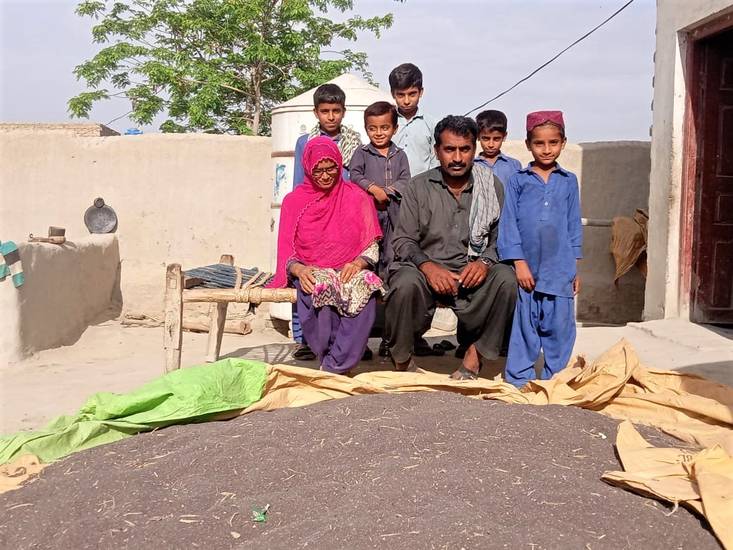Providing relief to small-holder farmers in the wake of COVID-19 crisis

COVID-19 has intensified economic woes for small-holder farmers in Pakistan and around the world. There is considerable uncertainty around harvesting of crops. This has put a strain on small-holder farmers who have been severely affected by the restrictions imposed due to the onset of COVID-19.
Mansab Mai is a small-holder farmer and a participant of Sarsabz livestock farmer field school located in the remote village of Basti Arain in Punjab province of Pakistan. Her husband works as a daily wage labourer and has been out of work for the past one month or more due to the prevailing lockdown. With no savings of their own, Mansab Mai and her husband struggled to provide for themselves and their family of seven children.
In November 2019, with support from the Food and Agriculture Organization of the United Nations (FAO), Mansab Mai and other women participants of the farmer field school recieved 1kg of canola seeds each to help them get a head-start ahead of the crop growing season. Using the new skills and techniques that she had learnt during the livestock farmer field school sessions, Mansab Mai sowed the canola seeds on a small piece of land. She hoped to get a good harvest, however, this was her first time planting any variety of oilseed crop and thus, she was uncertain about the results.
Throughout the farming cycle, FAO field facilitators guided the family on land preparation, fertilizer requirements, irrigation requirements and timings, pest control through integrated pest management and harvesting techniques. They also introduced the idea of value addition to Mansab Mai and her family by suggesting methods which would help them extract edible oil from the seeds.
“FAO provided 1kg of canola seeds to each of the women participants of the livestock farmer field school.The introduction of conola crop in our livestock farmer field school has had incredible reults. Harvesting of these crops has led to a two-fold increase in the profits for farmers,” said Deeba Shaheen, livestock farmer field school facilitator, Basti Arain.
By April 2020, COVID-19 had spread across all provinces of Pakistan, with Punjab province the most severely affected by the outbreak. This not only endangered livelihoods of rual communities but was also expected to spark a heavy economic and food insecurity crisis across the province. Daily wage workers were considered to be amongst the most affected groups. Like millions of other daily wagers, Mansab Mai’s husband had also lost his earnings. This severely disrupted their daily lives.
It was around the same time that the canola, which Mansab Mai had spent many months tending to, was ready for harvest. The canola served as a ray of hope for her family during challenging times. Mansab Mai’s hardwork and determination led to a high yield of canola which she was able to sell in the local market for PKR13 000.
“During the lockdown period when my husband was out of work and we were struggling to make ends meet the canola harvest brought a welcome relief for our family,” said Mansab Mai. “The profit we made from selling the canola will help us get by during these difficult times when we have no other source of income. We will extract edible oil from the remaining 10kg of canola,” she added contendedly.
